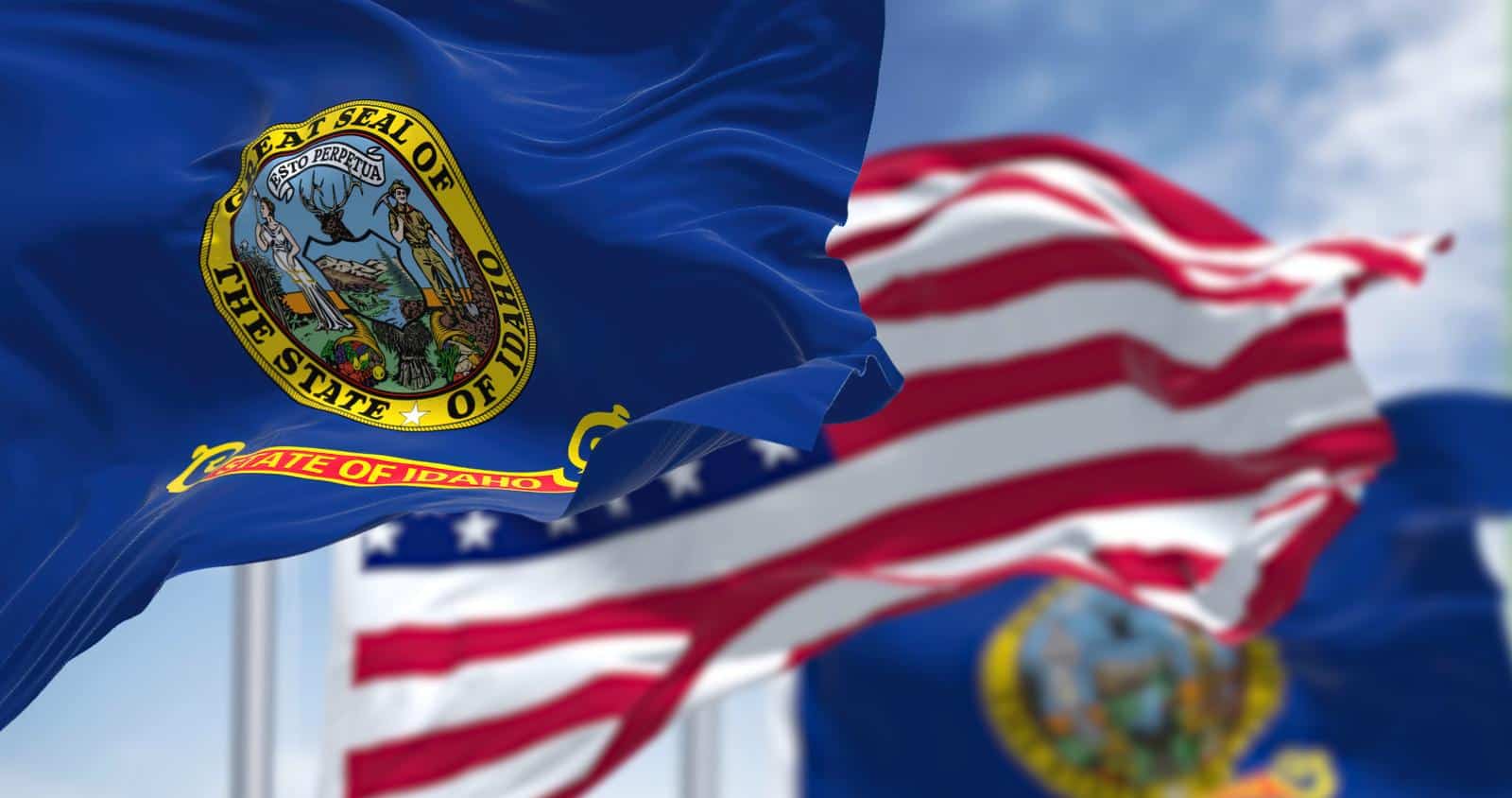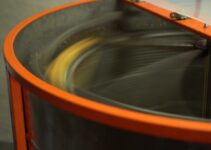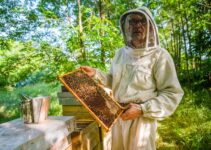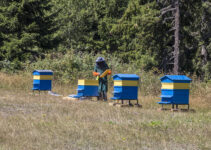Whether you are a hobby beekeeper or keep bees commercially to generate income for your family, there are laws that govern the industry. Ensuring you keep your bees in accordance with the law in Idaho is the responsibility of each beekeeper. What are the beekeeping laws in Idaho, and how do you stay up to date with the changes?
Beekeeping laws in Idaho are less restrictive due to the important role played by bees in the state’s agriculture. Hobbyists with less than 50 colonies are also accommodated by law, but city by-laws must be observed to protect the public. Commercial keepers pay annual fees and require permits.
Many beekeepers that get into beekeeping as a hobby do not realize that there are laws and regulations for keeping bees. Each state can formulate its own laws to regulate beekeeping, manage the environment and restrict the spread of disease and pests among pollinators. If Idaho is your state, we have documented the regulations you need to be aware of as a beekeeper.
Laws For Beekeepers In Idaho
Why does beekeeping require laws to regulate the activity? No matter where you live, regulations will govern, restrict and determine the best practices for beekeeping in your region.
While you may feel these laws are restrictive, there is, in reality, a method behind the strategy of implementing rules for beekeeping, many of which protect the beekeeping industry.
Laws in each state are put in place for the following reasons.
- Limit public danger from bees. Laws regarding where you can place beehives are in place to protect the public from being bothered by bees or the danger of getting stung.
- Disease control. Certain diseases can decimate pollinator populations in a region if there is no policy for handling infected hives.
- Pest control. Bee parasites threaten the survival of bee colonies, and laws are put in place to curb the spread of these pests.
- Control of exotic bees. Bees not local to the country can cause problems for local bee populations, requiring the import of exotic bees to be controlled.
- Beekeeper registration. Keeping a register of beekeepers allows the government to better implement the regulations to protect bees in the region.
While state laws govern beekeeping in Idaho in general, each city can introduce more restrictive by-laws that suit the city and its residents.
Idaho Laws For Hobby Beekeepers
Most hobbyist beekeepers keep their bees in their own backyard, which means that your neighbors and pets must be protected. Local by-laws intend to prevent commercial beekeeping operations from being undertaken in residential areas, where the bees can become problematic.
The definition of a hobbyist beekeeper in the state of Idaho is a beekeeper that keeps bees for recreation or pleasure rather than as a means of income and must have less than 50 bee colonies.
Hobbyist beekeepers are not required to register with the Department of Agriculture but are welcome to register voluntarily to assist in protecting the beekeeping industry in Idaho.
Hobbyist beekeepers are also exempt from the annual taxes levied on beehives, but voluntary registration with the Idaho Honey Industry Association (IHIA) requires an annual fee of $10.00.
Can You Keep Bees In Your City In Idaho?
Most cities in Idaho allow beekeeping within the city limits, but most will have restrictions that must be observed. Before going ahead with keeping bees in your backyard, it is best to consult your local city authorities for their local regulations and whether beekeeping is allowed in your area.
In general, there are more restrictions for keeping bees in urban and suburban areas than in rural locations.
Here are the by-laws for hobbyist beekeepers in Idaho Falls, and most other cities will have similar ordinances that you need to check before placing your beehives.
Laws for Hobbyist Beekeepers in Idaho Falls, Idaho
| Number of hives | *No more than 2 hives on lots less than 8000 sq feet *Maximum of 3 hives on lots from 12000 to 20000 sq feet *No more than 5 hives on lots of ½ acres or more. |
| Yard area where bees can be kept | Bees can only be kept on the side or rear of the yard in a residential lot. Lots designated for commercial or industrial use cannot be used for beekeeping. |
| Type of hives for beekeeping | Beehives with removable frames must be used, and the hives must be properly maintained. |
| In yard location | No beehive may be placed closer than 7 feet to any property boundary line. Hives must not be placed within 30 feet of any building playground or outside entertainment area. |
| Boundary considerations | If the beehive is within 30 feet of a boundary, the hives must be enclosed with a hedge or impervious fence at least 6 feet high and 20 feet long to force the bees to fly up. |
| Provision of water | A freshwater source must be made available for the bees within 15 to 20 feet of the hives to prevent them from using water sources on neighboring properties. |
| Types of bees that can be kept | Only Apis mellifera bees may be kept. |
| Breeding queens | Queens must be used from stock bred for gentleness and non-swarming characteristics. |
| Dangerous colonies | Colonies that display aggressive behavior or Africanized bees must be removed or re-queened with a suitable queen. |
| Identification | All beehives must be clearly marked with the name and contact number of the beekeeper. |
| Comply with Idaho state laws | All beekeepers are required to make their hive sites available for inspection by state authorities if required. |
| Registration | Even though the state does not require hobby beekeepers to register, the city requires beekeepers to register each beehive with the City’s Animal Shelter. The name, contact number, and address of the beekeeper and the location address of each beehive are required for the registration. |
These rules for beekeepers in Idaho Falls are an example that each city can impose its own regulations on beekeeping based on the unique requirements of that city.
Always check with the local authorities in your city before beekeeping in your backyard!
Idaho Laws For Commercial Beekeepers
Beekeeping commercially is a significant part of the agriculture sector in Idaho. The state is known for its potatoes, alfalfa, and quality seed production, especially carrot seeds.
These agricultural successes often depend on bees that play a major role in pollinating these crops. The need for bees in the agricultural sector provides a wide scope for beekeeping at a commercial level, giving Idaho a thriving commercial beekeeping industry.
Most commercial beekeepers will keep their bees in rural farmland areas and will move their bees around for pollination services and from season to season.
If you have more than 50 beehives in the state of Idaho, you are considered a commercial beekeeper, which has laws different from that of hobby beekeepers.
All commercial beekeepers must be registered with the local authorities, and a fee of $10 annually and a fee of $0.10 (10c) per hive above 50 hives are also charged annually.
Commercial beekeepers must make their apiary sites available for inspection by designated inspectors.
If a beekeeper moves bee colonies out of the state and back into the state for seasonal pollination in neighboring states, the beekeeper is required to hold a permit for the transportation of bees across state lines.
The permit has associated fees, and an authorized inspector must inspect the bees upon their return to Idaho state.
This permit and inspection measure is in place to reduce the transfer of pests and diseases between states to protect the beekeeping industry in Idaho.
How To Stay Up To Date With Idaho Beekeeping Laws
As a beekeeper in Idaho, it is wise to stay up to date with changes in the legislation that relates to beekeeping, whether a hobbyist or a commercial beekeeper.
The best way to stay up to date with the latest laws for beekeeping in Idaho is to be part of a local beekeeping association.
The associations disseminate information to their members regarding rules and regulations for beekeeping in the region and help beekeepers with inspections and permits.
The state-maintained website Idaho Honey Industry Association is a good place to start investigating your options for beekeeping in Idaho.
Locally managed beekeeping associations include the Magic Valley Beekeepers Association and the Treasure Valley Beekeepers Club.
Clubs and associations are not only a good way to keep up to date with the beekeeping laws but are also a wealth of general beekeeping knowledge due to the experienced members.
Most beekeepers are willing to share their experiences with new beekeepers and offer advice on problems and best practices for beekeeping in Idaho. This makes a local beekeeping club an invaluable resource of knowledge for a new beekeeper!
Conclusion
Idaho is a good location for beekeeping due to its diverse agricultural sector with a strong crop component requiring pollination by bees. Hobbyist beekeepers also have a good deal of legal freedom to pursue beekeeping.
Follow the state and city laws, and you should have a great experience keeping bees as a hobby or for income in Idaho!
References
https://legislature.idaho.gov/wp-content/uploads/statutesrules/idstat/Title22/T22CH25.pdf
https://www.idahofallsidaho.gov/DocumentCenter/View/163/Chapter-5–Animals-PDF
https://naldc.nal.usda.gov/download/CAT81750530/PDF
https://legislature.idaho.gov/wp-content/uploads/statutesrules/idstat/Title22/T22CH25.pdf
http://www.magicvalleybeekeepers.org/




